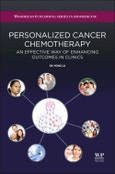Personalized Cancer Chemotherapy separately describes and addresses "individualized cancer chemotherapy" (ICC) strategies new and old, to provide readers with new insights into their characteristics and techniques, as well as key debates and future trends in this area. The book devotes chapters to drug sensitivity testing, cancer biomarkers and bioinformatics detection, pharmacogenetics, individualized antimetastatic therapy, drug combinations, assistant chemotherapy, and cost-effectiveness considerations.
A major obstacle to controlling cancer growth and metastases in patients is the inappropriate use of anticancer and antimetastatic drugs. Researchers and clinicians are now beginning to focus on ICC also called "personalized cancer chemotherapy" (PCC), to improve therapeutic quality and outcomes by selecting and prescribing the most appropriate and effective drugs. Using genetic, molecular, and bioinformatics data and modern experimental techniques, known tumor genes can be detected more easily than ever before; the average speed of genetic sequencing has increased 15,000 to 50,000 times since the Human Geonme Project was completed.
This book will help readers understand the pros and cons of each individualized cancer chemotherapy strategy from different angles so as to make good judgments and predictions of drug responses and clinical outcomes.
- Explores the central components of cancer treatment
- Investigates new developments in cancer treatment
- Discusses the many strategies of individualized cancer chemotherapy
Table of Contents
BiographyAbstract
Preface
Contents
Introduction
Drug sensitivity testing
Individualized cancer chemotherapy by detecting cancer biomarkers
Pharmacogenetics
Individualized antimetastatic therapy
Drug combinations
Assistant chemotherapy
Cost-effectiveness of individualized cancer chemotherapy
Discussion
Conclusion








